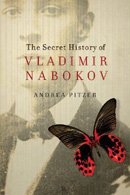The New Republic weighs in on The Secret History
In June 1962 Mary McCarthy wrote what would become perhaps the most famous review ever written of Nabokov’s Pale Fire. In “Bolt from the Blue,” which ran in the pages of The New Republic, McCarthy called the novel a “a clockwork toy, a chess problem, an infernal machine,” and “one of the very great works of art of this century.”
Today in The New Republic, Alexander Nazaryan reviews The Secret History, along with the much-anticipated Nabokov play The Tragedy of Mister Morn. The title is “Nabokov’s Politics: New works alter his image as a disinterested aesthete.”
Here’s an excerpt from his comments on The Secret History:
… instead of treating Nabokov as a coddled aesthete removed from the concerns of the twentieth century, Pitzer depicts him as fully engaged with the concerns of the world—though he was far too courtly, too genteel, to shout his convictions from the rooftops. Given how much scholarship concerns Nabokov’s oeuvre, it is bold to contend, as Pitzer does in her introduction, that “a whole layer of meaning in his work has vanished.” That statement had me sharpening my critical daggers. But by the end, Pitzer managed to pretty much make her case, mostly by not belaboring the point, though also never deviating from it.
And about Mister Morn (which you should certainly also get and read), he writes
…another reason to take note of Mister Morn: As the translators note in their introduction, in this play “Nabokov explores more fully and explicitly than he ever would again what he saw as the origins of the revolutionary impulse in a death-instinct and passion for destruction.” That Nabokov finds revolutionaries savage is blatantly apparent in Mister Morn, as is his wonder and dread at death. Given his family’s standing and his own upbringing, nobody could rightly suspect Nabokov of leftist sympathies, even if he was not quite the conservative detractors depict. But here, he rather audaciously aligns social upheaval with psychological nihilism, the destruction of palaces with the destruction of the inward self. For all the derision Nabokov heaped upon the “elderly gentleman from Vienna with an umbrella,” he was exploring, in this early work, both the psychology of crowds—their tendency to mass madness—and the psychology of individuals who are forlorn or, maybe, much worse.
Nazaryan, who wrote the review for TNR (which you can read in its entirety here), also edits the New York Daily News’ Page Views books blog.
